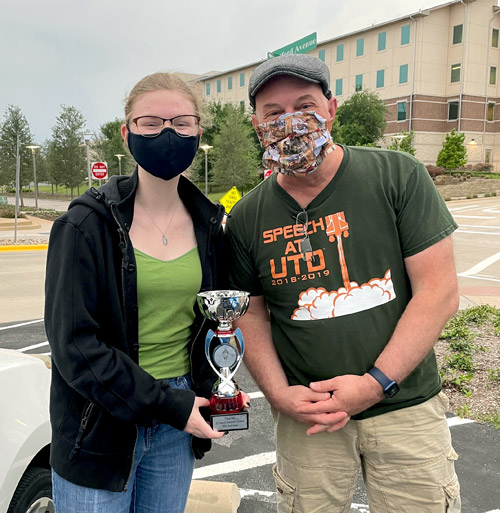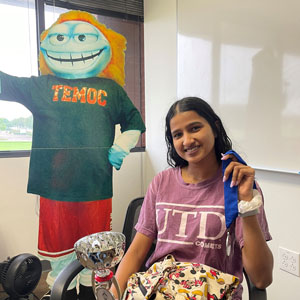
Even though competitors in The University of Texas at Dallas speech and debate program could not travel to in-person tournaments this year, students still gained experience by participating in a greater number of virtual events.
Scott Herndon, director of speech and debate, said the expanded roster of events presented several learning opportunities.
“During the pandemic, we took the opportunity to see what we could do,” he said. “We were able to see what it felt like to compete in different formats and determine what was realistic for the future of our program as we move back toward in-person events.”
The debate team increased the number of tournaments and the types of events in which it participated. The speech team did the same, boosting its tournament participation threefold this year.
The speech team was created only three years ago, but many members earned top honors in this year’s tournaments.
Speech team coach Bradley Skiles, who also is an information technology manager at UT Dallas, said the silver lining to the COVID-19 challenges was that the students were able to get great experience.
“The improvement that I saw from the fall to the spring was just amazing,” Skiles said. “Because these students worked hard and then got practical experience by competing in front of judges, they just got so much better.”
One speech team member who excelled this year was senior Deepalakshmi Elangovan. She was UT Dallas’ first student to be a national speech finalist, placing fifth in the informative speaking category at the Pi Kappa Delta national tournament. In addition, the team earned the second-place sweepstakes award for small schools at the same tournament.
“The improvement that I saw from the fall to the spring was just amazing. Because these students worked hard and then got practical experience by competing in front of judges, they just got so much better.”
UT Dallas speech team coach Bradley Skiles
The debate team qualified two teams for the National Debate Tournament (NDT), which Herndon said was a significant accomplishment. In addition, the team of junior Hasan Mubarak and sophomore Storm Lasseter finished 17th at the national Cross Examination Debate Association (CEDA) tournament.
For the second year in a row, Ragya Kaul BA’21 was named a CEDA National Debate Scholar, recognizing her academic and competitive success, and she was selected to the CEDA All-American Debate Team.
Herndon noted that the increased number of online tournaments helped the team try formats other than policy debate.
“Some of the events were bigger hits than others,” he said. “We won’t pursue all those formats again, but now we know there’s an interest on campus to do some different formats for debate, and that there’s an opportunity for us to be successful.”

As the speech and debate teams increased their event portfolio, more UT Dallas faculty from the School of Arts and Humanities (A&H) got involved. Dr. John Gooch, associate dean for graduate education in A&H and associate professor of literature and rhetoric, provided coaching for some of the new debate events, and Kathy Lingo, professor of instruction and assistant director of theater and dance, advised student competitors on interpretive events.
Skiles said that while he expects the teams to travel to tournaments starting in the fall, he anticipates it will be another year of growth, with more students participating in more events.
“With the experience we gained this year, I expect us to be far more competitive and successful next year,” he said.
Herndon said he plans for UT Dallas to participate in at least two debate formats in the fall — traditional policy debate as well as parliamentary debate. He said the strategy fits with the overall five-year vision for the program.
“The goal is to have a nationally competitive speech and debate program that is participating in multiple debate events while also competing in national-level speech events,” he said.
Margaret Moore, a public policy junior who was recognized as the top junior National Parliamentary Debate Association speaker at a tournament this year, said she is ready to get back to face-to-face competition soon.
“I’m so excited to travel next year and have everyone together in person,” she said. “I can’t wait to see how this team is going to shape up over the next couple of years.”
